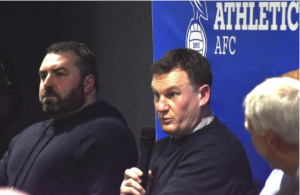The Oldham MPs Angela Rayner, Debbie Abrahams, and Jim McMahon joined forces with Latics’ chief executive to argue against the club’s termination of its long-standing Category 3 academy, which housed over thirty coaches and over one hundred youngsters between the ages of nine and sixteen.
Any club that is relegated from the English Football League has two years to win promotion and maintain their academy status. After that, clubs that are unable to rebuild may choose to keep their youth setup, but they will no longer receive financial assistance or insurance, which includes payment to teams in the event that any of its young players sign with another team.
Royle wants the regulations changed specifically with regard to that protection.
“The Premier League in 2013 came out with the EPPP, which is the Elite Player Performance Plan, and it was the programme set up to really revolutionise youth development in this country all with the target of getting better run academies from Category 1, which is Premier League level, to Category 4, which is where we are probably now,” he said.
Every club that has been relegated and removed from the Football League for two years has been forced to give up that model. “We had a Category 3 academy that was regulated and registered with the EFL and funded from the Premier League via the EFL. What happens when you get relegated from the Football League – you don’t have a choice. I should emphasise that I say ‘that model’.
We are no longer recognised, registered, or controlled as a Category 3 EPPP academy.
We have attempted to amend the norms and regulations regarding that. We addressed a letter to the Premier League and our three local MPs signed it together. We also wrote directly to the Premier
“I’ve had conversations with the PFA regarding youth player care, as well as through the MPs regarding the football regulator’s intervention. “Unfortunately, we were unable to alter the rules or regulations. “The same thing happened to Chesterfield, Notts County, Stockport, and Tranmere when they all left the league; if you’re out for two years, that’s it, you have to close it down. It’s heartbreaking. There are roughly 110 players in the under nines to under 16s schoolboy programme.”
“Because they enrolled in the EPPP academy, they are protected. You lose all protection as soon as you are not covered by that scheme and are unregulated. They are free to travel wherever they like, be taken by anybody they choose, and essentially you would be paying for something that benefits others at a cost of around £600,000 annually.”

Royle went on, “We are incredibly saddened and shocked by the closure of that portion of the institution and the model. We made every effort, using our connections and the wise assistance of the legislators (I must thank them), but in vain.
“A joint letter was signed by Debbie Abrahams, Jim McMahon, and Angela Rayner. We have not been able to ask for better; they have been fantastic and very helpful. The letter was very strong, pleading with the Premier League to reconsider its policies about this.
“In our level, a club typically stays for four years, so a five-year timeframe would be more reasonable. Alternatively, you could have a window of time where you have protection but not financing, allowing you to continue running the school-girls or school-boys project while things change. However, the safeguard is in place. It serves as a safeguard rather than an inducement, ensuring that the money spent on coaching sessions and courses won’t be lost if a player is plucked by a major team.
“I always knew that if we weren’t promoted this year, it would come to this, and the clock started ticking when the team was demoted.
Leave a Reply